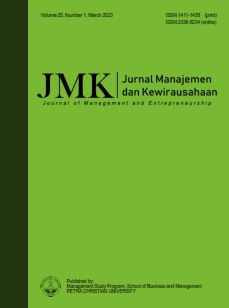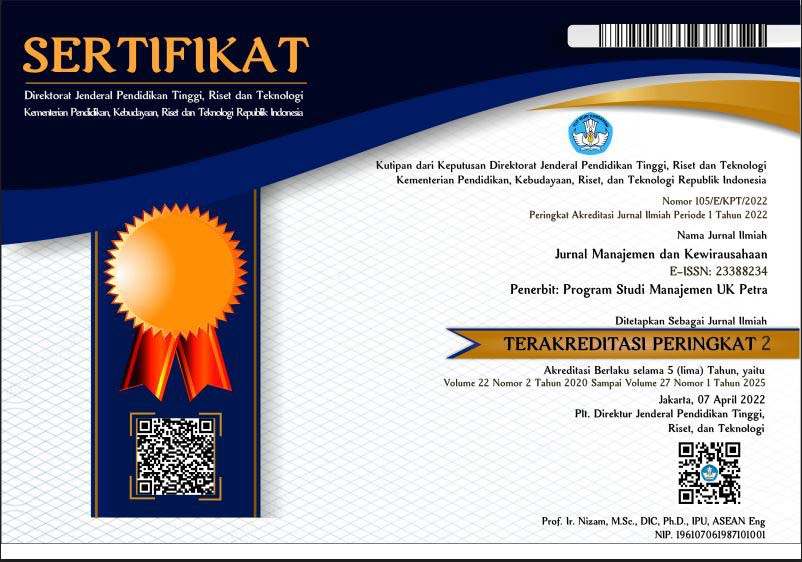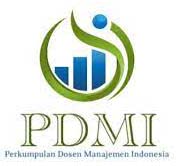DEVELOPING A SUSTAINABLE TOURISM VILLAGE MODEL: AN EXPLORATORY STUDY
 :
:
https://doi.org/10.9744/jmk.25.1.63-82
Keywords:
Tourism village, community-based tourism, sustainability tourism, social entrepreneurship, tourism managementAbstract
Studies on sustainable tourism villages (STV) development highlighted the role of community-based tourism (CBT) and social entrepreneurship (SE). Previous studies mostly focused on community and social entrepreneurship but neglected tourism management, which became the research gap of this study. The aim of this study was to investigate the contributions of CBT, SE, and tourism management in sustaining a tourism village. This study used a qualitative method, so the data were collected through focus group discussions and in-depth interviews with key players of Kaki Langit Mangunan Tourism Village, Yogyakarta. The results showed that the involvement and integration of CBT and SE were crucial in achieving STV. Finally, STV also required professionalism in management.
References
Adityaji, R. (2018). Formulasi strategi pengembangan destinasi pariwisata dengan menggunakan metode analisis SWOT: Studi kasus kawasan pecinan Kapasan Surabaya. Pesona: Jurnal Pariwisata, 3(1), 19–32. https://doi.org/10.26905/jpp.v3i1.2188
Adnyana, I. M. (2020). Dampak green tourism bagi pariwisata berkelanjutan pada era revolusi industri 4.0. Jurnal Ilmiah Manajemen, Ekonomi, dan Akuntansi, 4(3), 1582–1592. https://doi.org/10.31955/mea.v4i3.692
Alfianto, F. Y. (2021). Peran pemerintah desa dalam pengembangan desa wisata di Pakuncen. Paradigma, 10(1), 1–16.
Alvord, S. H., Brown, L. D., &, & Letts, C. W. (2004). Social entreprenuership and social transformation: An exploratory study. Journal of Applied Behavioral Science, 40(3), 260–282. http://dx.doi.org/10.1177/002188 6304266847
Andy, H. (2020). Tahapan merintis dan mengembangkan desa wisata. Retrieved from https://eticon.co.id/tahap-merintis-desa-wisata/
Aquino, R. S., Lück, M., & Schänzel, H. A. (2018). A conceptual framework of tourism social entrepreneurship for sustainable community development. Journal of Hospitality and Tourism Management, 37, 23–32. https://doi.org/10.1016/j.jhtm.2018.09.001
As’adi, M., Zaman, A. N., Dewi, A. C., Naoval, A., & Montreano, D. (2020). Kajian model desain aplikasi mobile yang berkelanjutan study of sustainable mobile application design models in tourism villages. Jurnal Manajemen Industri dan Logistik, 04(01), 47–57. https://doi.org/10.30988/jmil.v4i1.419
Badaruddin, B. (2017). Wisata lembah hijau di desa Ijobalit ditinjau dari aspek pengelolaan dan dampaknya terhadap ekonomi masyarakat. Society, 8(1), 21–40. https://doi.org/10.20414/society.v8i1.1495
Bagyo, Y., Kustanto, A., Hariadi, S., & Ratnasari, S. D. (2018). Peranan perguruan tinggi dalam mewujudkan desa wisata Petik Jeruk Selorejo-Kabupaten Malang. Jurnal Abdi Masyarakat, 2(1). https://doi.org/10.30737/jaim.v2i1.239
Barišic, P., & Maric, I. (2012). The role of management as a strategic tourism guideline: Case of Croatia. International Journal of Business and Management Studies, 1(2), 423–431.
Bhattacharyya, J. (2004). Theorizing community development. Journal of the Community Development Society, 34(2), 5–34. https://doi.org/10.1080/15575330409490110
Bibuljica, H. (2014). The management as a function on tourism development in Kosova. Academic Journal of Interdisciplinary Studies, 3(2), 165–170. http://dx.doi.org/10.5901/ajis.2014.v3n2p165
Boukas, N., & Chourides, P. (2016). Niche tourism in Cyprus: Conceptualising the importance of social entrepreneurship for the sustainable development of islands. International Journal of Leisure and Tourism Marketing, 5(1), 26–43. http://dx.doi.org/10.150 4/IJLTM.2016.077128
Cortés, L., & Husain-Talero, S. (2020). Social entrepreneurship and sustainable tourism in Colombia: A baseline study in post-conflict regions. The International Journal of Social Sustainability in Economic, Social, and Cultural Context, 16(2), 65–85. https://doi.org/10.18848/2325-1115/CGP/v16i02/65-85
Creswell, J. W. (2003). Research design: Qualitative, quantitative, and mixed methods approaches (2nd ed). Thousand Oaks, CA: Sage Publications.
Day, J., & Mody, M. (2017). Social entrepreneurship typologies and tourism: Conceptual frameworks. In Sheldon, P. J. & Daniele, R. (Eds.), Tourism on the Verge. Cham, Switzerland: Springer International Publishing.
de Lange, D., & Dodds, R. (2017). Increasing sustainable tourism through social entrepreneurship. International Journal of Contemporary Hospitality Management, 29(7), 1977–2002. http://dx.doi.org/10.1108/IJCHM-02-2016-0096
Đurkin, J., & Perić, M. (2017). Organising for community-based tourism: Comparing attitudes of local residents and local tourism entrepreneurs in Ravna Gora, Croatia. Local Economy, 32(7), 678–691. https://doi.org/10.1177/0269094217734811
Fitriana, R., Simanjuntak, D., & Dewanti, R. (2020). Pembekalan materi CHSE (Cleanliness, health, safety and environmental sustainability) dalam training of trainers akademisi pendamping desa wisata. Caradde: Jurnal Pengabdian Kepada Masyarakat, 3(1), 138–145. https://doi.org/10.31960/caradde.v3i1.539
Giotis, G., & Papadionysiou, E. (2022). The role of managerial and technological innovations in the tourism industry: A review of the empirical litera-ture. Sustainability, 14(9), 1–20. https://doi.org/10.3390/su14095182
Habibi, M. M. (2022). Sinergi peran pemerintah desa dan masyarakat dalam pengembangan wisata untuk meningkatkan kesejahteraan masyarakat. Jurnal Ilmiah Pendidikan Pancasila dan Kewarganegaraan, 7(2), 429–437. http://dx.doi.org/10.17977/um019v7i2 p429-437
Jaelani, A., & Hanim, T. F. (2021). Teknologi digital, keberlanjutan lingkungan, dan desa wisata di Indonesia. Al-Mustashfa: Jurnal Pe-nelitian Hukum Ekonomi Syariah, 6(2), 237–244. http://dx.doi.org/10.24235/jm.v6i2.9613
Lasally, A., Kharunnisa, H., & Mahfudz, A. A. (2021). Pengembangan desa wisata berbasis komunitas di Yogyakarta (Studi kasus: Desa wisata Sambi). Al-Mustashfa: Jurnal Penelitian Hukum Ekonomi Syariah, 6(1), 34–42. http://dx.doi.org/10.24235/jm.v6i1.8021
Lasmana, A., & Wiryanti, D. A. (2017). Faktor-faktor yang mempengaruhi kepatuhan wajib pajak pada KKP Pratama Majalaya. Jurnal Akunida, 3(2), 1–10. https://doi.org/10.30997/jakd.v3i2.983
Liu, A., & Wall, G. (2006). Planning tourism employment: A developing country perspective. Tourism Management, 27(1), 159–170. https://doi.org/10.1016/j.tourman.2004.08.004
McGinnis, G., Harvey, M., & Young, T. (2020). Indigenous knowledge sharing in Northern Australia: Engaging digital technology for cultural interpretation. Tourism Planning and Development, 17(1), 96–125.
Miles, M. B., & Huberman, A. M. (1992). Analisis data kualitatif : Buku sumber tentang metode metode baru. Jakarta: Penerbit Universitas Indonesia.
Moleong, L. J. (2014). Metodologi penelitian kualitatif [edisi revisi]. Bandung: Remaja Risdakarya.
Mottiar, Z., & Boluk, K. (2017). Understanding how social entrepreneurs fit into the tourism discourse. In Sheldon, P. J. & Daniele, R. (Eds.), Tourism on the Verge. Cham, Switzerland: Springer International Publishing.
Munandar, T. A., & Sudrajat, I. (2020). Peningkatan pendapatan asli desa melalui fungsi manajemen objek wisata di desa Sawarna Kec. Bayah Kab. Lebak. Jurnal Hermeneutika, 6(2), 1–11. http://dx.doi.org/10.30870/hermeneutika.v6i2.10096
Nadra, A. K. (2021). Tinjauan pengembangan desa wisata Rantih kota Sawahlunto dengan pendekatan pariwisata berkelanjutan. Jurnal Pariwisata Bunda, 2(1), 13–20.
Namono, C. (2018). Digital technology and a community framework for heritage rock art tourism, Makgabeng Plateau, South Africa. African Archaeological Review, 35(2), 269–284. https://doi.org/10.1007/s10437-018-9298-y
Nuryanti, W. (1999). Heritage, tourism, and local communities. Yogyakarta: UGM Press.
Pantiyasa, I. W., & Supartini, N. L. (2016). Potential development of rural tourism in penatih village. Journal of Business on Hospitality and Tourism, 2(1), 383–392. https://dx.doi.org/10.22334/jbhost.v2i1.73
Peredo, A. M., & McLean, M. (2006). Social entrepreneursip: A critical review of the concept. Journal of World Business, 41(1), 56–65. https://doi.org/10.1016/j.jwb.2005.10.0 07
Porter, B. A., Orams, M. B., & Lück, M. (2018). Sustainable entrepreneurship tourism: An alternative development approach for remote coastal communities where awareness of tourism is low. Tourism Planning and Development, 15(2), 149–165. https://doi.org/10.1080/21568316.2017.1312507
Priyamanaya, N., & Rijanta, R. (2020). Pariwisata dan ketahanan desa: Peluang keberlanjutan desa wisata Taro. Jurnal Bumi Indonesia, 1–11.
Puriati, N. M., & Darma, G. S. (2021). Menguji kesiapan pengelolaan desa wisata berbasis manajemen modern sebagai penggerak ekonomi rakyat. Bisma: Jurnal Manajemen, 7(2), 319–334. https://doi.org/10.23887/bjm.v7i2.34162
Purmada, D. K., Wilopo, & Hakim, L. (2016). Pengelolaan desa wisata dalam perspektif community based tourism (Studi kasus pada desa wisata Gubugklakah. Jurnal Administrasi Bisnis, 32(2), 15–22.
Pusparani, P., & Rianto, R. (2021). Implementasi konsep pentahelix dalam pengembangan desa wisata Cibuntu. Sadar Wisata Jurnal Pariwisata, 4(1), 1–8. https://doi.org/10.32528/sw.v4i1.5389
Rumiati, A. T., Gunawan, J., & Trisunarno, L. (2021). Proses partisipatif dalam pemetaan desa untuk pembangunan berkelanjutan di kawasan Seka-wan Sejati Lombok Barat, Nusa Tenggara Barat. Sewagati, 5(2), 176–182.
Sheldon, P. J., & Daniele, R. (2017). Social entrepreneurship and tourism: Philosophy and practice. In Sheldon, P. J. & Daniele, R. (Eds.), Tourism on the Verge. Cham, Switzerland: Springer International Publishing.
Soemardiono, B., Yudiartono, H., & Soebijantoro. (2021). Community-based tourism in Kresek village, Madiun, East Java. International Journal of Applied Sciences in Tourism and Events, 5(1), 22–31. https://doi.org/10.31940/ijaste.v5i1.2366
Song, S. (2018). Innovative research on training mode of tourism management talents under the trend of lintelligent tourism. Advances in Social Science, Education, and Humanities Research, 205, 1105–1108. https://doi.org/10.2991/iccese-18.2018.247
Suteja, I. W., Wahyuningsih, S., & Masyhudi, L. (2019). Potensi desa Pemepek sebagai kawasan wisata pedesaan berbasis lingkungan agraris di Kecamatan Pringgarata Kabupaten Lombok Tengah. Jurnal Ilmiah Hospitality, 8(2), 71–78. https://doi.org/10.47492/jih.v8i2.13
Untari, S. (2019). Kolaborasi perguruan tinggi pemerintah desa-swasta. Jurnal Praksis dan Dedikasi Sosial, 2(2), 75–81. http://dx.doi. org/10.17977/um032v2i2p75-81
von der Weppen, J., & Cochrane, J. (2012). Social enterprises in tourism: An exploratory study of operational models and success factors. Journal of Sustainable Tourism, 20(3), 497–511. https://doi.org/10.1080/09669582.2012.663377
Widyastuty, A. A. S. A., Rukmana, S. N., & Tribhu-waneswari, A. B. (2020). Penguatan promosi desa wisata berbasis kearifan di desa Pujon Kabupaten Malang. Jurnal Penamas Adi Buana, 4(1), 5–12. https://doi.org/10.36 456/penamas.vol4.no1.a2426
Winarno, T., Said, M. M., & Hayat, H. (2021). Pengembangan desa wisata adat Using Kemiren melalui pendekatan penta helix. Journal of Governance and Local Politics, 3(2), 137–145. https://doi.org/10.47650/jglp.v3i2.298
Wisudawati, N. N. S., & Maheswari, A. I. A. (2018). Potential of silver craft product through to community-based for tourism sustainability in Celuk Village. International Research Journal of Management, IT and Social Sciences, 5(1), 9–15. https://doi.org/10.21744/irjmis.v5i1.588
Yasir, Y., Firzal, Y., Sulistyani, A., & Yesicha, C. (2021). Penta helix communication model through community based tourism (CBT) for tourism village development in Koto Sentajo, Riau, Indonesia. Geojournal of Tourism and Geosites, 37(3), 851–860. DOI 10.30892/gtg.37316-718
Yin, R. K. (2015). Qualitative research from start to finish. New York: Guilford Publications.
Yuliani, R., & Abdi, M. (2021). Faktor-faktor yang mempengaruhi pengembangan kampung Saribu rumah Gonjong. Menara Ilmu, 15(2), 85–92. https://doi.org/10.31869/mi.v15i2.2411
Downloads
Published
How to Cite
Issue
Section
License
Authors who publish on this journal agree to the following terms:
- Authors retain copyright and grant the journal right of first publication with the work simultaneously licensed under a Creative Commons Attribution License that allows others to share the work with an acknowledgement of the work's authorship and initial publication in this journal.
- Authors are able to enter into separate, additional contractual arrangements for the non-exclusive distribution of the journal's published version of the work (e.g., post it to an institutional repository or publish it in a book), with an acknowledgement of its initial publication in this journal.
- Authors are permitted and encouraged to post their work online (e.g., in institutional repositories or on their website) prior to and during the submission process, as it can lead to productive exchanges, as well as earlier and greater citation of published work (See The Effect of Open Access).


















